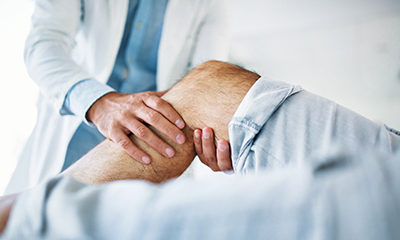Peripheral Artery Disease (PAD) Rehab
 Help for Leg Pain
Help for Leg Pain
Do you experience cramping, aching, or fatigue in your calf, thigh, or buttock muscles when walking that goes away within 5-10 minutes of rest? These symptoms are not necessarily a result of natural aging; you may have a dangerous, but treatable condition called peripheral artery disease. The good news is that you can find relief with our PAD rehabilitation program in Glenwood.
PAD Rehab
Glacial Ridge Health System’s cardiac rehab RNs are specially trained to deliver the PAD rehab program. The medically supervised exercise program helps increase blood circulation to your legs and decrease pain or discomfort when you walk. It can slow, stop, or reverse much of the damage to affected blood vessels in your legs caused by a buildup of fatty deposits, which impedes blood flow.
PAD Increases Risk of Heart Attack and Stroke
Although symptoms of PAD usually first show up in the legs, the problem is rarely confined to that area. People with PAD often have the same fatty deposits in other arteries too, such as those in the heart and brain.
Managing your risk factors for the disease can improve PAD symptoms and decrease your risk of a heart attack or stroke. Even if you don’t have PAD now, the key to preventing it is to change your lifestyle and manage current medical conditions.
Screening Saves Lives
You may want to ask your doctor about screening if you:
- Smoke or have a history of smoking
- Have diabetes
- Have high blood pressure
- Have high cholesterol
- Are age 65 or older
PAD can be diagnosed with a simple, non-invasive Ankle-Brachial Index (ABI) test to determine eligibility for our rehab program. An ABI test compares blood pressure in your ankle to the blood pressure in your upper arm. A lower blood pressure in your ankle is an indication of blocked arteries in your legs because they are not getting enough oxygen-rich blood.
Listen to Your Legs
Let our specialty-trained, multi-disciplinary team at Glacial Ridge Hospital help you get relief from discomfort when walking and reduce your risk of a heart attack or stroke. Our physicians and nurse practitioners are here to provide guidance and support for changing risk factors and, if recommended, refer you to our PAD rehab program.
Start by calling for an appointment with your provider. Call 320.634.5157 for Glenwood Medical Center, 320.346.2272 for Brooten Medical Center, or 320.239.2200 for Starbuck Medical Center.
Medicare now covers three, 30- to 60-minute sessions per week for up to 12 weeks of PAD Rehab.
